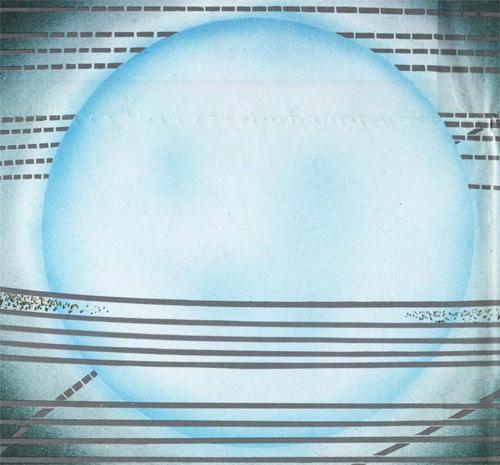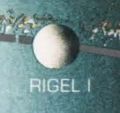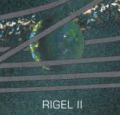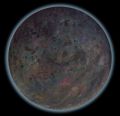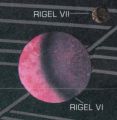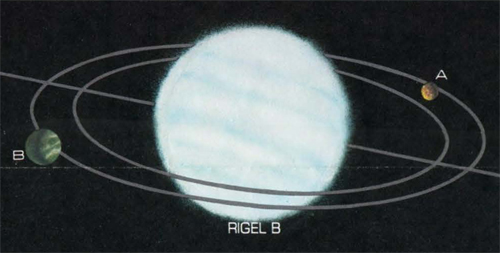Difference between revisions of "Rigel system (FASA)"
From Trekipedia
m |
|||
| (2 intermediate revisions by the same user not shown) | |||
| Line 1: | Line 1: | ||
| − | + | {{ImageInfoBox2|boxwidth=100%|float=|boxother=margin:auto;|name=Rigel system|file=rigel_system-maps.jpg|caption=Rigel system ([[Maps (Book)|Maps]])}} | |
| − | + | {{TableRow|title=Advertising|data= | |
| − | </div> | + | <!--Maps-->{{AmazonLink2|asin=B01FJ0JGIM}} |
| − | + | <!--SFC-->{{AmazonLink2|asin=0671790897}} | |
| + | }} | ||
| + | |}</div> | ||
A quadruple star system, Rigel (Beta Orionis) included two stars of interest: a [[Stellar Classes#Class B|blue-white]] supergiant (Rigel A) and a somewhat smaller blue-white giant (Rigel B), and the system supported a total of fourteen planets, six of which were inhabited. This remarkable number of [[Planetary Classes#Class M|Class M]] worlds was attributed to the star's extensive habitable zone, and to the Hakel radiation belt which surrounded the system's primary and shielded against the lethal radiation emitted by the [[Stellar Classes#Class B|B-Class]] supergiant.<ref name="Maps"/> | A quadruple star system, Rigel (Beta Orionis) included two stars of interest: a [[Stellar Classes#Class B|blue-white]] supergiant (Rigel A) and a somewhat smaller blue-white giant (Rigel B), and the system supported a total of fourteen planets, six of which were inhabited. This remarkable number of [[Planetary Classes#Class M|Class M]] worlds was attributed to the star's extensive habitable zone, and to the Hakel radiation belt which surrounded the system's primary and shielded against the lethal radiation emitted by the [[Stellar Classes#Class B|B-Class]] supergiant.<ref name="Maps"/> | ||
| − | + | {{Clear}} | |
| − | + | {{ImageInfoBox2|boxwidth=45%|float=left|name=Rigel A system|file=rigel_a-maps.jpg|caption=Rigel A system ([[Maps (Book)|Maps]])}} | |
| − | Rigel A | + | |}<gallery mode="nolines"> |
| − | <gallery mode="nolines"> | + | rigel-01-maps.jpg|[[Rigel I (FASA)|Rigel I]] ([[Tugn (FASA)|Tugn]]) |
| − | + | rigel-02-maps.jpg|[[Rigel II (FASA)|II]] ([[Atugn (FASA)|Atugn]]) | |
| − | + | rigel-03-maps.jpg|[[Rigel III (FASA)|III]] ([[Volum (FASA)|Volum]]) | |
| − | + | rigel-04-sfc.jpg|[[Rigel IV (FASA)|IV]] ([[Rigel IV (FASA)|Rigel IV]]) | |
| − | + | rigel-05-maps.jpg|[[Rigel V (FASA)|V]] ([[V'Geln (FASA)|V'Geln]]) | |
| − | + | rigel-06_07-maps.jpg|[[Rigel VI (FASA)|VI]] ([[Sirk (FASA)|Sirk]]) | |
| − | + | rigel-06_07-maps.jpg|[[Rigel VII (FASA)|VII]] ([[Aulia (FASA)|Aulia]]) | |
| − | + | rigel-08-maps.jpg|[[Rigel VIII (FASA)|VIII]] ([[Botchok (FASA)|Botchok]]) | |
| − | + | rigel-09-maps.jpg|[[Rigel IX (FASA)|IX]] ([[T'Ap (FASA)|T'Ap]]) | |
| − | + | rigel-10-maps.jpg|[[Rigel X (FASA)|X]] ([[Onot (FASA)|Onot]]) | |
| − | + | rigel-11-maps.jpg|[[Rigel XI (FASA)|XI]] ([[Pliu (FASA)|Pliu]]) | |
| − | + | rigel-12-tos03.jpg|[[Rigel XII (FASA)|XII]] ([[Egessemine (FASA)|Egessemine]]) | |
| − | + | </gallery></div> | |
| − | </gallery> | + | {{ImageInfoBox2|boxwidth=45%|float=left|name=Rigel BC system|caption=Rigel BC ([[Maps (Book)|Maps]])|file=rigel_b-maps.jpg}} |
| − | </div> | + | |} |
| − | |||
| − | Rigel BC | ||
* [[Rigel BC I (FASA)|I]]: [[Avali (FASA)|Avali]] | * [[Rigel BC I (FASA)|I]]: [[Avali (FASA)|Avali]] | ||
* [[Rigel BC II (FASA)|II]]: [[Ugoan (FASA)|Ugoan]] | * [[Rigel BC II (FASA)|II]]: [[Ugoan (FASA)|Ugoan]] | ||
</div> | </div> | ||
| − | + | {{References}} | |
| − | |||
| − | |||
<references> | <references> | ||
| − | <ref name="Maps"> | + | <ref name="Maps">{{RefMaps}}</ref> |
</references> | </references> | ||
| − | |||
[[Category:Library]] | [[Category:Library]] | ||
[[Category:Astrometrics]] | [[Category:Astrometrics]] | ||
| Line 48: | Line 45: | ||
[[Category:Games]] | [[Category:Games]] | ||
[[Category:RPG]] | [[Category:RPG]] | ||
| − | [[Category:FASA | + | [[Category:FASA Timeline]] |
| − | |||
Latest revision as of 03:48, 13 October 2020
A quadruple star system, Rigel (Beta Orionis) included two stars of interest: a blue-white supergiant (Rigel A) and a somewhat smaller blue-white giant (Rigel B), and the system supported a total of fourteen planets, six of which were inhabited. This remarkable number of Class M worlds was attributed to the star's extensive habitable zone, and to the Hakel radiation belt which surrounded the system's primary and shielded against the lethal radiation emitted by the B-Class supergiant.[1]
Rigel A system
Notes and References
- ↑ Maynard, Jeff (Author). Star Trek Maps. Star Trek. Book. Bantam Books. August 1980.



